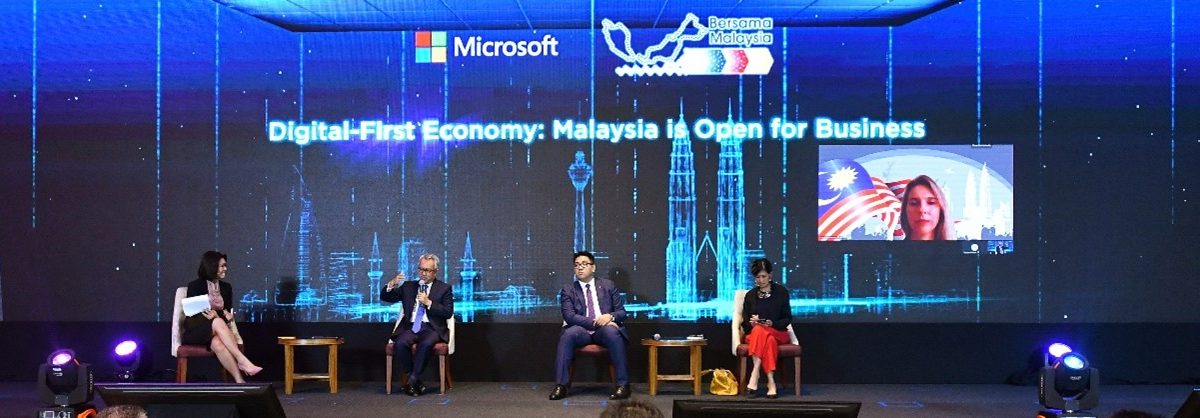
Going on-premise with SecureX orchestration remote
May 27, 2021Cyber Hygiene: An ounce of prevention is worth a pound of incident response
May 28, 2021To become a digital-first nation, there needs to be a cloud-first mindset

While COVID-19 has impacted economies throughout the world, Malaysia has remained resilient and has stayed on course to becoming a regional leader in the digital economy. With the launch of MyDIGITAL, Malaysia is on a solid footing in its journey to recover and reimagine its future, supported by the strong public-private-people partnerships to enhance the nation’s digital infrastructure and digital talent.
“We congratulate Malaysia and the Government for the bold and progressive vision outlined in MyDIGITAL. We are pleased to see how comprehensive the plan is and most importantly, how inclusive Malaysia’s digital economy will be,” said Andrea Della Mattea, President Asia Pacific, Microsoft.
On the important enablers that would help propel Malaysia’s digital economy forward, she added, “The digital future of Malaysia can’t be delivered without a talent ecosystem and it’s crucial that everyone has a digital-first and cloud-first mindset.”
Andrea was speaking at a panel discussion held in conjunction with the launch of Microsoft’s Bersama Malaysia, titled “Digital-first economy: Malaysia is open for business.” Joining the panel discussion were Surina Shukri, CEO of MDEC; Tengku Muhammad Taufik, President & Group CEO of PETRONAS; and Idham Nawawi, CEO of Celcom Axiata Berhad.
Skilling needs to be part of the conversation
Indeed, cloud technologies such as Artificial Intelligence (AI), Internet of Things (IoT), and machine learning are key enablers to the digital transformation. However, for Malaysia to truly benefit from it, there needs to be a plan to ensure the nation’s workforce can leverage and benefit from it too.
“Digital transformation starts with making sure we have the enabling infrastructure, unique data, unique cloud – technology that forms the basis of it,” said Surina. “But more importantly, you will also need digital skills and digital businesses as well. When you have this, it will ensure we have continued digital investments into the country so that we can continue to make sure that this growth is sustainable, and not just a one-time effort.”
Echoing this sentiment, Tengku Taufik emphasized that the “big themes” around upskilling and reskilling need to be part of the conversation of any leadership today. “Whether you are in energy or retail – skilling needs to be part of the conversation.” Tengku Taufik shared that PETRONAS is aiming to equip 80% of its employees with analytic skills, from basic, intermediate to specialist knowledge, in an effort to fully digitally-enable business operations in the near future.
Going back to inclusivity
With the world becoming a computer, technology will be critical to help every person and every organization adapt to this brave new post-COVID world. This is why establishing trusted digital infrastructure remains a crucial catalyst for Malaysia’s inclusive growth.
For instance, as part of Celcom’s efforts to bring wider connectivity to the local population including the rural communities, Idham shared, “We are working with the Malaysian Communications And Multimedia Commission (MCMC) through the Jalinan Digital Negara (JENDELA) program, on how do we bring 4G network coverage to 98%-100% coverage of the population. As part of the Axiata Group, we also build other applications and infrastructure to help enable this ecosystem. Additionally, we also have a fund to help startups build their applications. But more importantly, it is going back to inclusivity.”
Inclusivity is certainly an important facet in all efforts towards building a thriving digital economy. Technology needs to be accessible to everyone, and everyone should also need to know how to use it – embracing a digital mindset and a culture of innovation.
“The reality is that every aspect of our daily life, work, economy and society, are being transformed by technology. That is why we need to ensure that every person has the skills and tools to succeed in this digital, cloud and AI future. People are at the heart of digital transformation. As leaders, we must equip our people and digital talents with the skills and opportunities to lead Malaysia’s digital economy and with that, enable the innovation economy to thrive,” said Andrea.
To watch the full panel discussion, hit play on the video below.

